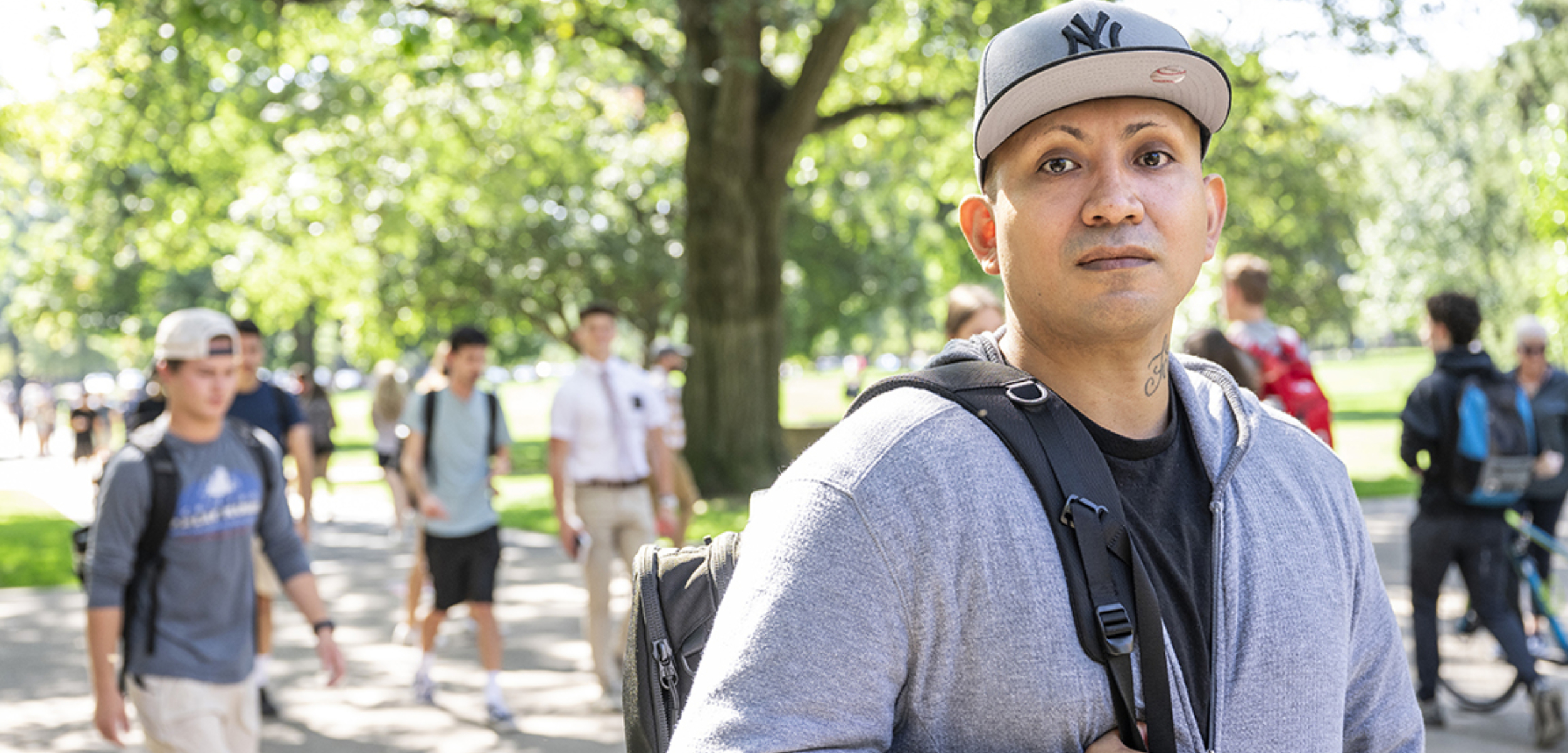
When Luis Moreno was released from the Washington State Department of Corrections in 2021, the contents of a few cardboard boxes and a prepaid phone card were all he had to his name.
He had just completed a 60-month sentence for 10 felony convictions that stemmed from a life sprinkled—and, at times, saturated with—bad choices. Yet Moreno was determined to turn his life around. He knew an education would give him an opportunity to start over, so he enrolled at CWU during his time at the Ahtanum View Work Release center in Yakima.
“I told them, ‘I don’t want to work; I want an education,’ and they said, ‘We’ve never had anyone do that here, but we will figure something out,” Moreno said. “Most inmates are anxious to stack up some cash before release, but I didn’t see how a couple thousand dollars would change my life.”
Supported by friends and family, Moreno managed to scrounge together enough money to buy a computer. He caught another break when the work release center allowed him four hours of internet access and six hours of computer privileges per day.
Despite his unconventional arrangement at Ahtanum View, he found a way to complete his first quarter of English literature classes through CWU Multimodal Learning.
“I didn’t always have access to Canvas, so I had to have the uncomfortable conversation with my instructors about the possibility of downloadable lectures,” Moreno said, referring to the online course management system used by Central. “Fortunately, my professors were willing to work with me.”
Once Moreno completed the work release program, he returned to his hometown of Cowiche, about 13 miles west of Yakima. It didn’t take long for remnants of his past to start creeping around, so when trouble came knocking, he decided to pack up his things and move 1,660 miles away to Junction City, Kansas, along with his teenage son.
“I had a lot of people stopping by to say hi, and I decided that the only way I could get away from my past was to move halfway across the country,” said Moreno, who lived in Junction City from 2007-08 while serving in the Army. “I have full custody of my son and I don’t want him to make the decisions I made. The best thing for us was to move.”
••••••••
In Pursuit of Positivity
Upon arriving in Kansas, Moreno secured a job as a COVID screener for a health clinic. Two promotions later, Moreno’s role as patient resource coordinator allowed him to continue his redemptive path by providing transportation and health care resources to patients. His new position gave him a chance to help community members connect with resources, while also opening the door for him to serve on a number of local committees.
The flexibility of that role afforded Moreno the time he needed to complete his CWU coursework and to be around for his son, Damien, who started his senior year of high school this fall.
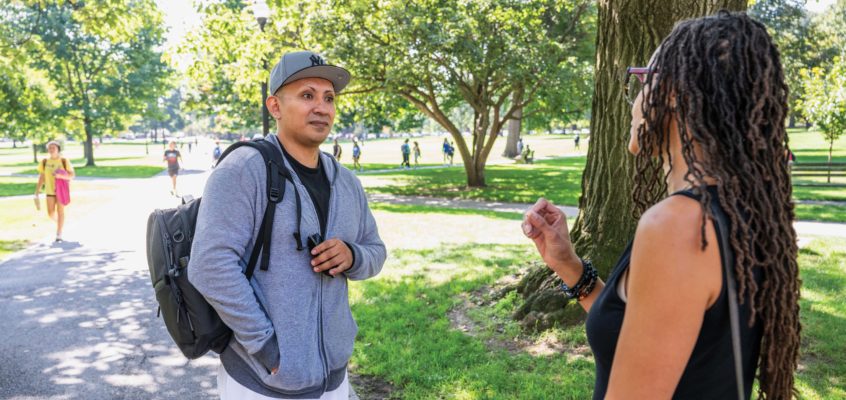
Moreno talks with Dr. Tiyi Morris, an Ohio State University professor of African American and African Studies, on the OSU campus in early October. Photo: Logan Wallace, Ohio State University
The move to Kansas proved to be exactly what Moreno and his son needed to start a new life—one free of trouble and rooted in education and positive choices.
“Before my release, my son was struggling in school, but he’s a completely different kid,” Moreno said. “He’s getting mostly As and Bs now, and I’m trying to talk him into going to college. He’s not sure what he wants to do yet, but he’s on a good track.”
The same can be said for Moreno, who completed dual degrees in English literature and Women’s, Gender, and Sexuality Studies through CWU last spring. He also participated in the McNair Scholars program and worked as a writing tutor and English grammar peer tutor in the Learning Commons.
Now, he’s taking his newfound knowledge and training with him to pursue a PhD in English at The Ohio State University. He moved to Columbus in August and is taking the first steps toward an advanced degree this fall.
“I’ve had a lot of grace on my side when applying to both Central and The Ohio State,” Moreno said. “When I decided to accept OSU’s offer, I contacted the director of Graduate Studies for the English Department and said, ‘This is my situation.’”
He had prepared himself for a letdown, but when the director checked the box, Moreno’s acceptance was placed on hold pending a secondary review.
He thought to himself: “Even if they say no, I was accepted into a top 35 school. No one can take that away from me.”
••••••••
Renewed Focus
As grateful as Moreno is to Ohio State for offering him such a high-profile opportunity, he knows he may not have gotten to this point if it weren’t for the support and guidance he received at Central. He said he can’t thank the CWU faculty and staff enough for everything they did for him over the past two years.
Moreno has paid his debt to society, but he also recognizes that he isn’t owed anything. It has taken people to believe in him to get where he is today.
“I will never have the words to express my appreciation for CWU,” he said. “Part of their mission is to nurture culturally sustaining practices that expand access and success to all students, and I can certainly attest to CWU’s commitment to that objective.”
“I will never have the words to express my appreciation for CWU. Part of their mission is to nurture culturally sustaining practices that expand access and success to all students, and I can certainly attest to CWU’s commitment to that objective.”
—Luis Moreno
Central played an integral role in helping Moreno discover the next step in his journey, but what truly set him up for success was his own drive to create a better life for himself.
After receiving a 91-month sentence in 2016 for drugs, weapons, burglary, and assault convictions, he was initially sent to Stafford Creek Corrections Center in Aberdeen. Early in his sentence, a counselor pulled him aside and told him that his sister had died. The counselor gave him a phone number to call, and it turned out to be a dead end.
“I eventually found out that she hanged herself,” Moreno said. “I also found out about a close family friend—who was a brother to me—that was shot and killed the same week. That’s when I decided that I needed to start making some changes in my life.”
From that point forward, Moreno used his time on the inside to reinvent himself. He enrolled in a business management certificate program at Grays Harbor Community College, which led him to start pursuing as much knowledge as he could through books and personal interactions.
“After I finished the certificate, I asked to be transferred to Walla Walla State Penitentiary because of the associate’s degree program,” he said. “I eventually switched my AA to a bachelor’s degree track through a direct transfer agreement and built up 180 college credits. I just kept taking every class they had—even the classes I didn’t need. Then I became a teacher’s assistant, and that’s what led to me to apply to Central.”
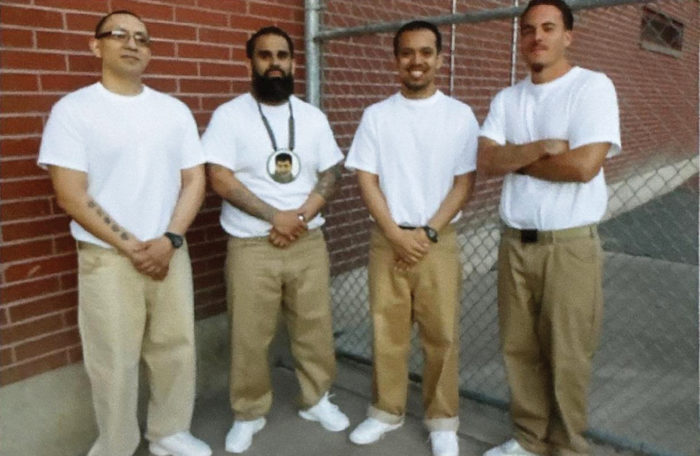
Moreno and three fellow prisoners were the first class from the Walla Walla State Penitentiary to be inducted into the Phi Theta Kappa honor society.
While serving time in Walla Walla, Moreno connected with Dr. Bill Krieger, a retired college professor who still works part time in the Washington State Penitentiary Prison Education Program.
After taking classes with Krieger for a year and experiencing the many benefits of his mentorship, Moreno believes he has found his calling.
“Dr. Krieger is an amazing man and he inspired me to become a teacher,” he said. “I would like to serve others in the same way he does. In a perfect world, I would be able to go back to the Walla Walla State Penitentiary and teach someday.”
Moreno’s motivation for becoming an educator in the prison system is to use his acquired privilege to, in the spirit of Gayatri Spivak, create the conditions so that the subaltern can speak.
“I have lived all across the U.S. and Mexico, and some of the best people I’ve ever met were on the inside,” he said. “My hope is to one day be in a position to help others.”
••••••••
Relatability Equals Respect
Krieger said he is honored that one of his former students—especially someone as gifted as Moreno—would want to follow in his footsteps. And while he appreciates a former student wanting to emulate him, he gives all of the credit to Moreno.
“Luis is the kind of student I hope for,” Krieger said. “The first thing that impressed me was that he was so reliable; there was never a doubt that he would turn something in and that the work would be exemplary. He’s had to work hard to increase his knowledge, skills, and insights, and I genuinely admire him for that.”
Krieger believes Moreno will make a superb educator someday because of his intrinsic ability to connect with other humans. He doesn’t just understand concepts; he can present information in a way that others can comprehend.
“I would have him explain things to other students in my class, and the information he relayed to them was spot on,” said Krieger, who hired Moreno as a TA. “But, most importantly, it was the way he relayed the information that was so helpful. That’s not an easy skill to master, and he’s already a natural.”
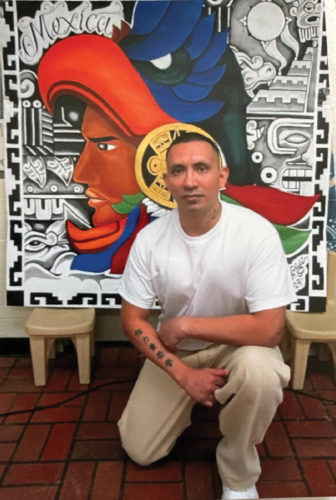
Future teaching potential aside, what impressed Krieger most was Moreno’s character and the authenticity he exhibits in his interactions. Krieger believes that side of him will carry him far in the profession.
“Luis really cares about people, and that’s huge for someone who wants to go into teaching,” he said. “Above all, you have to care about the people or it isn’t going to work.”
Krieger noted that if Moreno does end up teaching inmates someday, he will bring an extra layer of insight into the classroom because of his own experiences as an inmate.
That’s one intangible that few other educators can offer.
“If he ends up working with incarcerated people, he will have a personal connection that I didn’t have,” Krieger said. “He’s a very empathetic person, and he can look at a situation from someone else’s perspective and see what they are struggling with. He knows deep down that these people are good, and it’s his own strength of character that allows him to see that side in everyone.”
••••••••
Strong Advocates
Moreno absorbed as much as he could from Krieger while in Walla Walla, and upon his release to the Ahtanum View center, he took the next step in his education by enrolling at Central.
He first became interested in CWU because it was close to home and, as a result of the pandemic, offered an increasing variety of online degree options. As the admissions process unfolded, the team of counselors made him realize that he didn’t have to be ashamed of his past; he really could start over at Central.
“CWU was awesome the entire way,” Moreno said. “At first, I was worried about the stigma and limitation that come with a criminal history. But no one there judged me or tried to marginalize me. The staff supported me and gestured toward new doors for me to be successful.”
“CWU was awesome the entire way. At first, I was worried about the stigma and limitation that come with a criminal history. But no one there judged me or tried to marginalize me.”
—Luis Moreno
He credits Dr. Barry Shelton in the CWU English department for helping him secure the TA position in the Learning Commons, a job that became a focal point on his graduate school applications.
Concerned that Shelton may rescind the offer once he knew everything Moreno had done in his younger years, Moreno told his professor about his checkered past. But Shelton put his faith in Moreno and gave him a life-changing opportunity.
“Dr. Shelton took a huge risk on me, and I will forever be grateful to him for that,” Moreno said. “He told me, ‘you’re one of my best students, and I have no doubt you can do it.’”
Another instructor who helped Moreno live into his potential at Central was Dr. Sarah Sillin, an assistant professor of transnational American literature and an affiliate faculty member in the Women’s, Gender, and Sexuality Studies program.
She admires Moreno for his ability to embrace the online learning environment through wildly different circumstances than his peers.
“During the pandemic, everyone was trying to figure out how to make online learning work for themselves, and Luis seemed ahead of his time in that way,” said Sillin, who had Moreno in her Principles of English course in 2021 and, later, African American Literature.
“He recognized that the experience is a lot better when students have a chance to interact with one another and talk about things they can’t figure out on their own.”
Sillin complimented Moreno for being proactive about finding collaborators in the class so they could work through different theories together. She was impressed by his ability to understand, analyze, and explain English-language theories at an advanced level from the start.
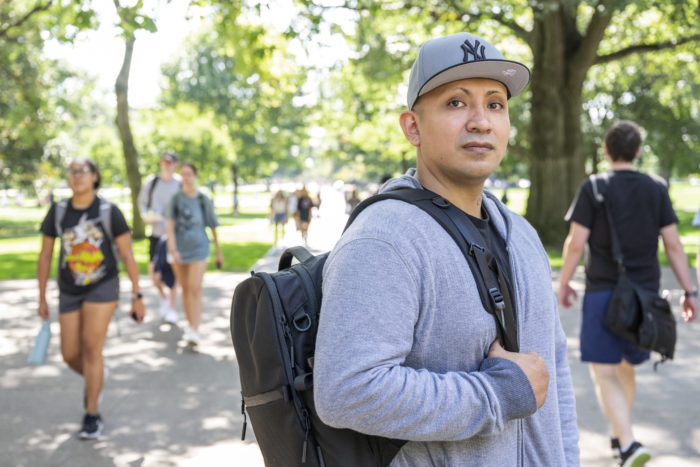
Moreno is now pursuing a PhD at The Ohio State University. Photo: Logan Wallace, Ohio State University
“That class can be kind of intimidating, and it was great to have a student like Luis who liked taking on questions he didn’t already know the answer to,” Sillin said. “That is very much his sensibility. He’s really good at that kind of thinking, and as he moved through the program, he was able to apply different theories to talk about race systems, racism, and related topics.”
••••••••
A New Chapter
After Moreno demonstrated such prowess during his short time at Central, Sillin and her colleagues—specifically, Dr. Shelton and Dr. James Seth—were more than happy to write him letters of recommendation for graduate school.
Moreno applied to three PhD programs, and The Ohio State quickly rose to the top of his list. He found that the cost of living in Columbus was affordable, even for a single parent, and after visiting campus last spring, he knew OSU was where he needed to take the next step in his education.
“I got to meet some people in the English and Women’s, Gender, and Sexuality Studies departments, and I was really impressed with everything about The Ohio State,” he said. “It seemed like a good place for me and my son to live, and we’re going to make it work.”
Now that he’s a PhD student at a top-tier institution, Moreno knows he’s going to have to prove himself. And while the road ahead may feel uncertain at times, he has already overcome so much that pursuing a graduate degree doing something he loves doesn’t really feel like work.
At the same time, he is also keenly aware that he wouldn’t be where he is today without everything he has been through. Now, he’s ready to write the next chapter in his life story—and it certainly won’t be the last.
“I’ve experienced things that a lot of people never will. ... But what I gained at Central changed how I view myself in relation to the world.”
—Luis Moreno
“I’ve experienced things that a lot of people never will,” Moreno said, adding that he doesn’t want his past to define him.
“I’ve lived a lot in 36 years. I’ve been a deacon at a church, I volunteered at a drug rehab center, I went to Bible college. I’ve also sold drugs, been in more fights than I can count, and been in a couple high-speed chases.”
Moreno’s previous life also included dropping out of his first year of high school, working as a night watchman, volunteering at a hospice facility, serving in the Army, and doing five years in state prison.
Combined, those experiences have all made him stronger. He believes they have prepared him for whatever the future holds, and he welcomes the challenge.
“Those experiences created the lens through which I interpret texts, and it’s those experiences that govern the tone of my prose,” he said. “But what I gained at Central changed how I view myself in relation to the world.
“I don’t know what’s next, but perhaps that’s the point. Venturing into the unknown, I borrow from Zakiyya Iman Jackson: ‘Redefining my being’ must be done ‘in improvisational terms rather than in fidelity to those inherited from’ oppression.”


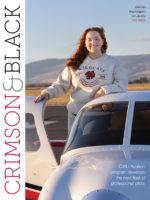


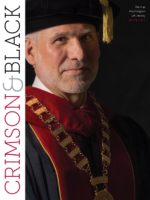
comments powered by Disqus